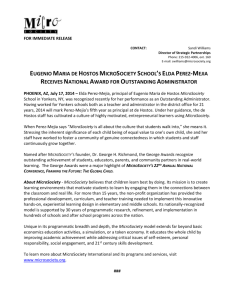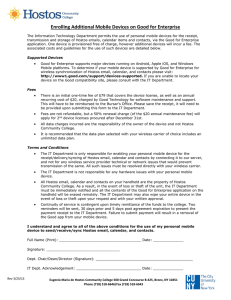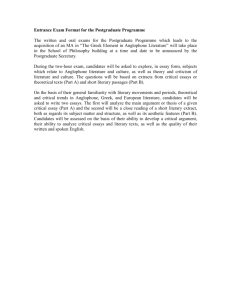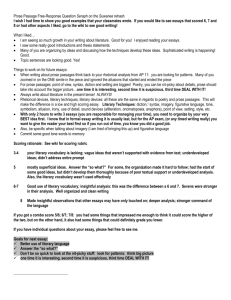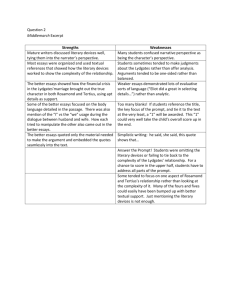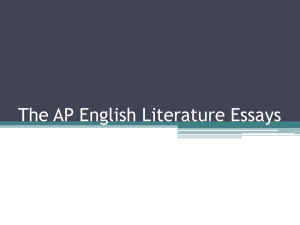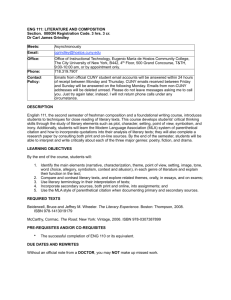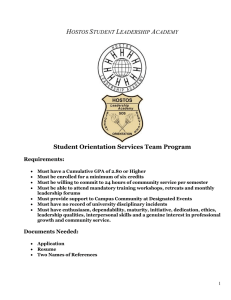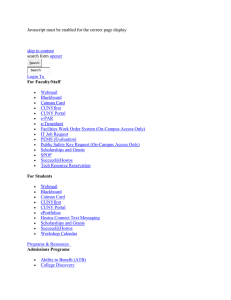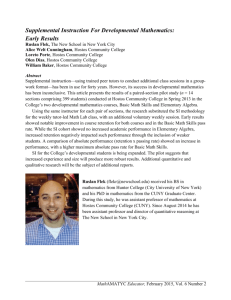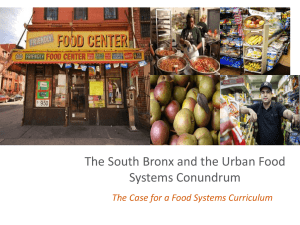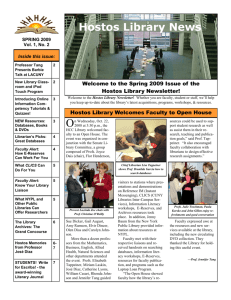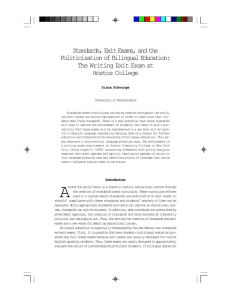English 111 (Literature and Composition) Guidelines for Faculty
advertisement
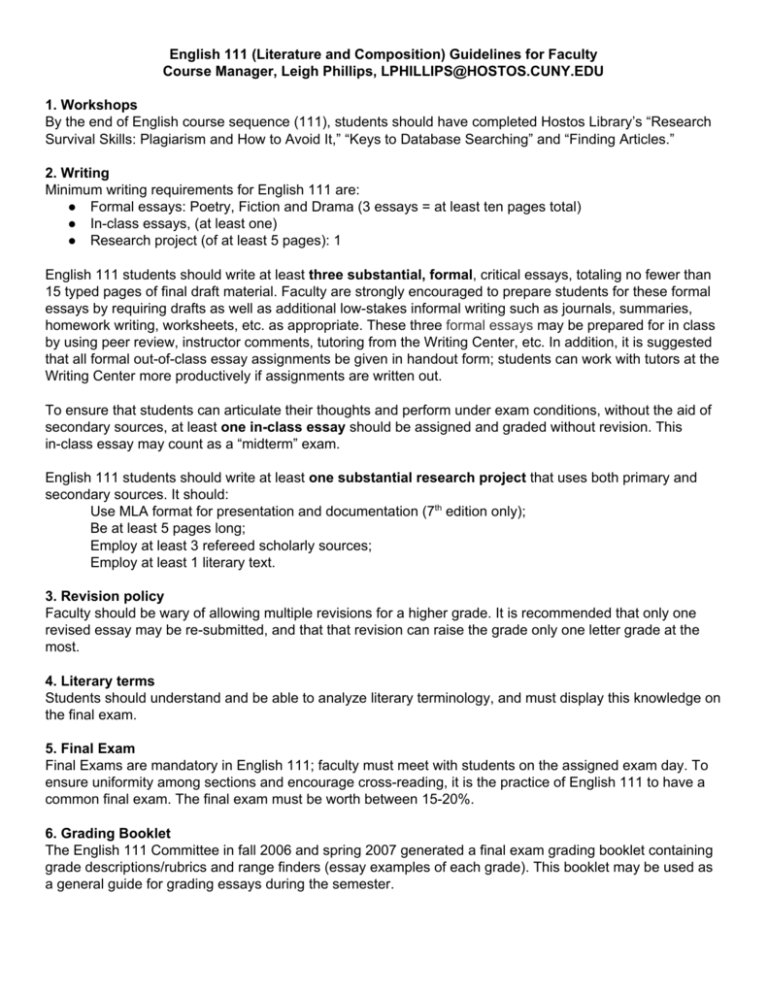
English 111 (Literature and Composition) Guidelines for Faculty Course Manager, Leigh Phillips, LPHILLIPS@HOSTOS.CUNY.EDU 1. Workshops By the end of English course sequence (111), students should have completed Hostos Library’s “Research Survival Skills: Plagiarism and How to Avoid It,” “Keys to Database Searching” and “Finding Articles.” 2. Writing Minimum writing requirements for English 111 are: ● Formal essays: Poetry, Fiction and Drama (3 essays = at least ten pages total) ● In­class essays, (at least one) ● Research project (of at least 5 pages): 1 English 111 students should write at least three substantial, formal , critical essays, totaling no fewer than 15 typed pages of final draft material. Faculty are strongly encouraged to prepare students for these formal essays by requiring drafts as well as additional low­stakes informal writing such as journals, summaries, homework writing, worksheets, etc. as appropriate. These three formal essays may be prepared for in class by using peer review, instructor comments, tutoring from the Writing Center, etc. In addition, it is suggested that all formal out­of­class essay assignments be given in handout form; students can work with tutors at the Writing Center more productively if assignments are written out. To ensure that students can articulate their thoughts and perform under exam conditions, without the aid of secondary sources, at least one in­class essay should be assigned and graded without revision. This in­class essay may count as a “midterm” exam. English 111 students should write at least one substantial research project that uses both primary and secondary sources. It should: th Use MLA format for presentation and documentation (7 edition only); Be at least 5 pages long; Employ at least 3 refereed scholarly sources; Employ at least 1 literary text. 3. Revision policy Faculty should be wary of allowing multiple revisions for a higher grade. It is recommended that only one revised essay may be re­submitted, and that that revision can raise the grade only one letter grade at the most. 4. Literary terms Students should understand and be able to analyze literary terminology, and must display this knowledge on the final exam. 5. Final Exam Final Exams are mandatory in English 111; faculty must meet with students on the assigned exam day. To ensure uniformity among sections and encourage cross­reading, it is the practice of English 111 to have a common final exam. The final exam must be worth between 15­20%. 6. Grading Booklet The English 111 Committee in fall 2006 and spring 2007 generated a final exam grading booklet containing grade descriptions/rubrics and range finders (essay examples of each grade). This booklet may be used as a general guide for grading essays during the semester. Instructor copies of Backpack Literature available upon request. Please submit completed syllabi to Lphillips@hostos.cuny.edu as early as possible, and promptly provide hardcopies of approved syllabi to Diosa Carmona or an English Department Office Assistant. OTHER HELPFUL INFORMATION HOSTOS ACADEMIC LEARNING CENTER http://www.hostos.cuny.edu/halc/ STUDENTS CAN BOOK APPOINTMENTS AT THE WRITING CENTER AS FOLLOWS: https://hostos.mywconline.com/ SPRING 2015 FINAL EXAM SCHEDULE Final Exams May 17­24 Spring 2015 ACADEMIC CALENDAR http://www.hostos.cuny.edu/Administrative­Offices/Office­of­the­Registrar/Academic­Info/Academic­ Calendar/Spring­2015 HOSTOS GRADING POLICY FROM REGISTRAR’S OFFICE http://www.hostos.cuny.edu/OOR/academic/grades.html [COURSE OBJECTIVES AND DESCRIPTION MUST APPEAR ON SYLLABI VERBATIM. REVISED SPRING 2013.] Course Objectives for English 111 : In this course the students will become familiar with three of the major genres of literature (fiction, poetry, and drama) and read and write critically about one or more of these forms. By the end of this course, they are expected to 1. Identify literary elements such as plot, character, point of view, setting, imagery, irony, tone, and symbols when analyzing stories, poems, and plays; 2. Interpret a literary text and support that interpretation with evidence gained from close reading; 3. Write clearly and coherently in varied, academic formats using standard English; 4. Integrate ideas with those of others from print and online sources; 5. Find, evaluate, analyze, and synthesize appropriate primary and secondary sources in a literary research paper; 6. Write at least three formal, critical essays (minimum ten pages total) and one research paper (minimum 5 pages). COURSE DESCRIPTION FROM CURRENT HOSTOS COURSE CATALOG ENG 111 Literature and Composition 3 credits, 3 hours Pre­requisite: ENG 110 English 111, the second semester of freshman composition and a foundational writing course, introduces students to techniques for close reading of literary texts. This course develops students' critical thinking skills through the study of literary elements such as plot, character, setting, point of view, symbolism, and irony. Additionally, students will learn the Modern Language Association (MLA) system of parenthetical citation and how to incorporate quotations into their analyses of literary texts; they will also complete a research paper by consulting both print and on­line sources. By the end of the semester, students will be able to interpret and write critically about each of the three major genres: poetry, fiction, and drama.
